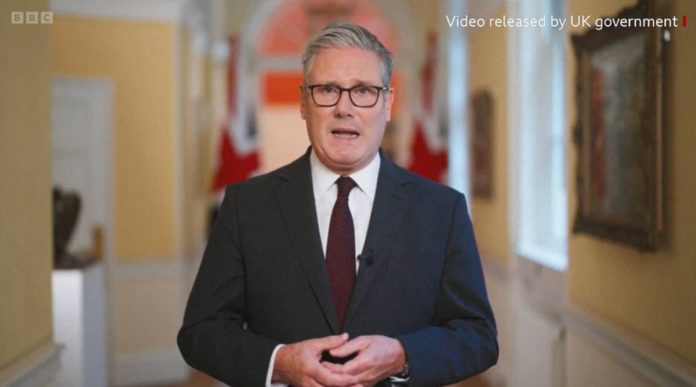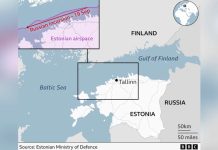
LONDON – Sir Keir Starmer has announced the United Kingdom’s recognition of a Palestinian state, in what represents a significant change in government policy.
In a video statement on X, the prime minister said: “In the face of the growing horror in the Middle East we are acting to keep alive the possibility of peace and a two-state solution.”
Australia, Canada and Portugal also announced formal recognition of the state of Palestine, with France expected to follow.
The decision has drawn fierce criticism from the Israeli government, families of hostages held in Gaza and some Conservatives. Responding on Sunday, Israeli Prime Minister Benjamin Netanyahu said a Palestinian state “will not happen”.
Saying he had “a clear message” to the leaders who had declared recognition, he added: “You are giving a huge reward to terrorism”.
Both the Israeli and United States governments say recognition is a diplomatic gift for Hamas following its attack in southern Israel on October 7, 2023 in which 1,200 people were killed and 251 taken hostage.
Sir Keir insisted the decision “is not a reward for Hamas” because it means Hamas can have “no future, no role in government, no role in security”.
“Our call for a genuine two-state solution is the exact opposite of [Hamas’s] hateful vision,” he said.
The move is a “pledge to the Palestinian and Israeli people that there can be a better future”, he continued, adding the “starvation and devastation [in Gaza] are utterly intolerable” and the “death and destruction horrifies all of us”.
Palestinian Authority President Mahmoud Abbas welcomed the decision, which Sir Keir had confirmed in a letter to the leader, saying it would help pave the way for the “state of Palestine to live side by side with the state of Israel in security, peace and good neighborliness”.
The Foreign Office said it means the UK “recognizes Palestinian statehood over provisional borders, based on 1967 lines with equal land swaps, to be finalized as part of future negotiations”.
The two-state solution refers to the creation of a Palestinian state in the West Bank and Gaza Strip, with East Jerusalem as its capital, broadly along the lines that existed prior to the 1967 Arab-Israeli war.
A state of Palestine is currently recognised by around 75% of the UN’s 193 member states, but has no internationally agreed boundaries, capital or army – making recognition largely symbolic.
Due to Israel’s military occupation in the West Bank, the Palestinian Authority, set up in the wake of peace agreements in the 1990s, is not in full control of its land or people. In Gaza, where Israel is also the occupying power, Hamas has been the sole ruler since 2007.
Announcing Canada’s recognition on Sunday, Prime Minister Mark Carney offered “partnership in building the promise of a peaceful future” for both Palestine and Israel, while Australia’s Anthony Albanese said it was “part of a coordinated effort to build new momentum for a two-state solution”.
Portugal’s Foreign Minister Paulo Rangel called the two-state solution “the only path to a just and lasting peace”.
In July, Sir Keir set a deadline of the UN General Assembly meeting, which takes place next week, for the UK to announce recognition unless Israel took “substantive steps to end the appalling situation in Gaza, agree to a ceasefire and commit to a long-term, sustainable peace, reviving the prospect of a two-state solution”.
Efforts to secure a ceasefire in Gaza – let alone a long-term solution to the Israel-Palestine conflict – have faltered. Israel sparked international outrage when it recently carried out an air strike on a Hamas negotiating team in Qatar. (BBC)







